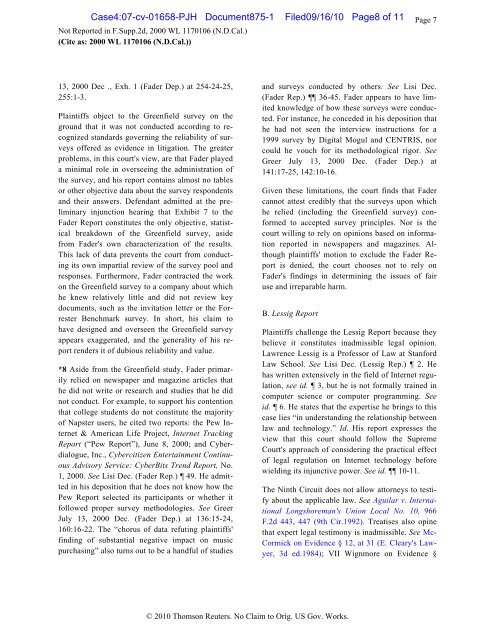exhibit 2 - SAP Lawsuit Portal
exhibit 2 - SAP Lawsuit Portal
exhibit 2 - SAP Lawsuit Portal
Create successful ePaper yourself
Turn your PDF publications into a flip-book with our unique Google optimized e-Paper software.
Case4:07-cv-01658-PJH Document875-1 Filed09/16/10 Page8 of 11<br />
Not Reported in F.Supp.2d, 2000 WL 1170106 (N.D.Cal.)<br />
(Cite as: 2000 WL 1170106 (N.D.Cal.))<br />
13, 2000 Dec ., Exh. 1 (Fader Dep.) at 254-24-25,<br />
255:1-3.<br />
Plaintiffs object to the Greenfield survey on the<br />
ground that it was not conducted according to recognized<br />
standards governing the reliability of surveys<br />
offered as evidence in litigation. The greater<br />
problems, in this court's view, are that Fader played<br />
a minimal role in overseeing the administration of<br />
the survey, and his report contains almost no tables<br />
or other objective data about the survey respondents<br />
and their answers. Defendant admitted at the preliminary<br />
injunction hearing that Exhibit 7 to the<br />
Fader Report constitutes the only objective, statistical<br />
breakdown of the Greenfield survey, aside<br />
from Fader's own characterization of the results.<br />
This lack of data prevents the court from conducting<br />
its own impartial review of the survey pool and<br />
responses. Furthermore, Fader contracted the work<br />
on the Greenfield survey to a company about which<br />
he knew relatively little and did not review key<br />
documents, such as the invitation letter or the Forrester<br />
Benchmark survey. In short, his claim to<br />
have designed and overseen the Greenfield survey<br />
appears exaggerated, and the generality of his report<br />
renders it of dubious reliability and value.<br />
*8 Aside from the Greenfield study, Fader primarily<br />
relied on newspaper and magazine articles that<br />
he did not write or research and studies that he did<br />
not conduct. For example, to support his contention<br />
that college students do not constitute the majority<br />
of Napster users, he cited two reports: the Pew Internet<br />
& American Life Project, Internet Tracking<br />
Report (“Pew Report”), June 8, 2000; and Cyberdialogue,<br />
Inc., Cybercitizen Entertainment Continuous<br />
Advisory Service: CyberBits Trend Report, No.<br />
1, 2000. See Lisi Dec. (Fader Rep.) 49. He admitted<br />
in his deposition that he does not know how the<br />
Pew Report selected its participants or whether it<br />
followed proper survey methodologies. See Greer<br />
July 13, 2000 Dec. (Fader Dep.) at 136:15-24,<br />
160:16-22. The “chorus of data refuting plaintiffs'<br />
finding of substantial negative impact on music<br />
purchasing” also turns out to be a handful of studies<br />
and surveys conducted by others. See Lisi Dec.<br />
(Fader Rep.) 36-45. Fader appears to have limited<br />
knowledge of how these surveys were conducted.<br />
For instance, he conceded in his deposition that<br />
he had not seen the interview instructions for a<br />
1999 survey by Digital Mogul and CENTRIS, nor<br />
could he vouch for its methodological rigor. See<br />
Greer July 13, 2000 Dec. (Fader Dep.) at<br />
141:17-25, 142:10-16.<br />
Given these limitations, the court finds that Fader<br />
cannot attest credibly that the surveys upon which<br />
he relied (including the Greenfield survey) conformed<br />
to accepted survey principles. Nor is the<br />
court willing to rely on opinions based on information<br />
reported in newspapers and magazines. Although<br />
plaintiffs' motion to exclude the Fader Report<br />
is denied, the court chooses not to rely on<br />
Fader's findings in determining the issues of fair<br />
use and irreparable harm.<br />
B. Lessig Report<br />
© 2010 Thomson Reuters. No Claim to Orig. US Gov. Works.<br />
Page 7<br />
Plaintiffs challenge the Lessig Report because they<br />
believe it constitutes inadmissible legal opinion.<br />
Lawrence Lessig is a Professor of Law at Stanford<br />
Law School. See Lisi Dec. (Lessig Rep.) 2. He<br />
has written extensively in the field of Internet regulation,<br />
see id. 3, but he is not formally trained in<br />
computer science or computer programming. See<br />
id. 6. He states that the expertise he brings to this<br />
case lies “in understanding the relationship between<br />
law and technology.” Id. His report expresses the<br />
view that this court should follow the Supreme<br />
Court's approach of considering the practical effect<br />
of legal regulation on Internet technology before<br />
wielding its injunctive power. See id. 10-11.<br />
The Ninth Circuit does not allow attorneys to testify<br />
about the applicable law. See Aguilar v. International<br />
Longshoreman's Union Local No. 10, 966<br />
F.2d 443, 447 (9th Cir.1992). Treatises also opine<br />
that expert legal testimony is inadmissible. See Mc-<br />
Cormick on Evidence § 12, at 31 (E. Cleary's Lawyer,<br />
3d ed.1984); VII Wignmore on Evidence §


